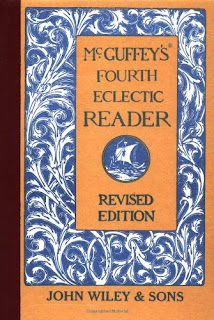We love using the Mc Guffey Readers. I've had several people ask me, "How do you use them?" There are many ways to use these books there are even workbooks to use with them (Although, I find them very expensive!).
First let me say, if you have advanced readers the Mc Guffey's are a great option for you. It is extremely difficult to keep advanced readers challenged AND find age appropriate material for them to read. You will find both in the Mc Guffey's Readers, especially if you are of a Christian persuasion.
Each lesson starts with a list of vocabulary words, we review the new words (**see update) and then she reads the story aloud to me. I ask her to pause one-count for commas, two-count for periods until she masters it naturally.
Because we already use Spell to Write and Read for our "reading" and spelling, we use the Mc Guffey Readers mostly as oral exercises, teaching our children to read accurately, slowly and to enunciate their words for others to hear and understand. We do not do the "slate exercises" or writing exercises, we just read these sections as we would any other lesson. This also gives them practice reading in cursive. Our entire lesson may only take 10 minutes or less. (**see update)
Read more to learn about the estimated grade levels of each reader.
Also, we did not start the Mc Guffey Readers until after my children had begun reading using Spell to Write and Read, after they had learned all the phonograms and how to sound out a new word on their own. This reduced the pressure to perform and made the readers great oral exercises. As we progress through the reader it becomes more challenging to read and then we are not only practicing reading aloud, but also learning to read new words.
**Update: If you have advanced readers you will reach a point where a few vocabulary words become challenging. They may be able to read the words but may not understand what they mean. (ex. from book 3; malicious, truant, ignorant, haste, gnawing, etc.) Since we've finally reached that point, I've been developing vocabulary worksheets to accompany the lessons in order to expand our child's vocabulary so she can continue to be challenged by these wonderful books. One worksheet for looking up the vocabulary words and one to use the new word in a sentence. We do worksheets for 2 days and read the lesson on the 3rd. If you are interested in these worksheets, please let me know via comment and I will work to add them on the blog.
I found this analysis of the Mc Guffey grade levels online HERE
Below is quoted from the above link:
I have just processed, with the Lexile Analyzer, prose samples from the McGuffey Readers that I’ve been able to find online. The books are not in the Lexile database. And I don’t think poetry can be mechanically, yet accurately analyzed. Occasionally there is a sample that isn’t aligned with the others in grade level, deviating from upper-level books normally, to 7th-grade, 8th-grade, or graduate-school level. I have determined the general pattern, though, to be that the books cover a two-grade range in lower levels, and a range of several grades in the higher levels. Because the Lexile Analyzer accepts selections of only one-thousand words at a time, I selected sections ranging from several lessons in the beginnings of the primer and first books, to a few paragraphs each of two lessons in the same section in the later books, checking the beginning and end in lower books, and also the middle parts of the higher books. I don’t believe revisions have changed the grade levels, but think it would require a more thorough analysis of various editions, which I don’t have access to, to be sure.
Here are the results:
Eclectic Primer: 1st grade
1st Eclectic Reader: 1st–2nd grades
2nd Eclectic Reader: 3rd–4th grades
3rd Eclectic Reader: 5th–6th grades
4th Eclectic Reader: 6th–8th grades
5th Eclectic Reader: 7th grade–college sophmore
6th Eclectic Reader: 9th grade–college senior
1st New Reader: 1st–2nd grades
2nd New Reader: 3rd–4th grades
3rd New Reader: 4th–5th grades
4th New Reader: 5th–6th grades
5th New Reader: 6th–12th grades
6th New Reader: 12th grade–college sophomore
High-School Reader: 9th–12th grades
Alternate 3rd Reader: 6th–8th grades
Alternate 4th Reader: 8th–12th grades
Alternate 5th Reader: 11th grade–college senior
posted by:







Comments (0)
Post a Comment